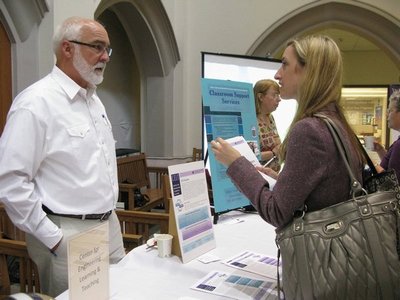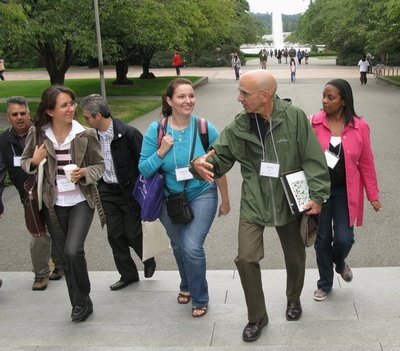September 30, 2010
New faculty get orientation, too — in the Faculty Fellows Program
Chantel Prat was nervous. She was spending her first full week on the UW campus, wondering if she’d be successful in classes. She sat through several days of orientation, growing increasingly panicky.
She thought, “How in the world am I going to be flexible and available to [so many people]? How do I make the time to do all that’s important?”
Prat is not a student, but a new assistant professor of psychology who has spent the last five years as a post doc and independent researcher at Carnegie Mellon. Yet, like a new freshman trying to figure things out, she found her first week on campus overwhelming. Luckily she got help in the weeklong Faculty Fellows Program, designed to help new faculty members get oriented and learn more about their teaching role.
“I went through a whole developmental cycle,” Prat said. “I started out not knowing what I didn’t know, and as I picked up information I began to feel increasingly panicked. Then I got some hands-on experience and some advice from experienced teachers, and now I feel really prepared.”
Prat was just one of 85 new faculty from all three campuses who attended this year’s Faculty Fellows Program. Sponsored by Undergraduate Academic Affairs, it is organized and run by a group of experienced faculty called senior fellows, all of whom have won the Distinguished Teaching Award.
“We talked about starting a program 15 years ago at a CIDR (Center for Instruction Development and Research) advisory board meeting,” said Jaime Diaz, who co-directs the program. “George Bridges and Fred Campbell, who were then the associate dean and dean of undergraduate education, got it going.”
Diaz, a professor of psychology, was part of the planning for that first program and has continued ever since. Susan Kemp, the other co-director, was one of the new faculty going through that first program.
“It really helped me understand this university and this campus,” said Kemp, who is an associate professor of social work. “I’d come from teaching at Columbia and had done my doctorate there. So I’d come from a private university on the East Coast to a public university on the West Coast. It was great to get an orientation to the campus. But there was also the network of people I met — both my fellow participants and the senior fellows. I still know a ton of the people from both of those levels.”
Learning about the culture of the university and meeting your peers, as well as senior faculty who can help you, are two purposes of the Faculty Fellows Program. But the heart of it is sessions about teaching. In fact, one thing that has been offered every year from the beginning is a microteaching session in which each new faculty member is videotaped giving a presentation and then receives feedback from his or her peers and senior fellows.
Prat said the microteaching session was for her the most valuable thing about the program. The new faculty were broken into groups of five, with two senior fellows facilitating. Each new faculty member made a three- to five-minute presentation that was videotaped and played afterward.
“It’s the first time I ever watched myself give a lecture, and it was horribly painful to watch. You can’t help seeing all of your flaws,” Prat said. “They instruct you to talk about your strengths first, but even with that explicit instruction, we all started trying to justify the weaknesses.”
But she said the feedback she received was very constructive and helpful, and that she got some ideas for her teaching just by watching her peers, who were all from different fields.
New faculty also had an introduction to teaching technology, including a hands-on session — something Prat particularly appreciated. “You can tell someone all day long, but just sitting there and doing it is what really counts,” she said. “Thanks to that session I have a course website, I have a gradebook, it’s already done.”
Newcomers like Prat weren’t the only ones attending the Faculty Fellows Program. Because there were few new hires, the program was not held last year. That’s why second-year veterans like Evan Solomon, assistant professor of oceanography, were on hand. Although he was juggling some other things, including submitting a research paper on deadline, he said the session was still worth his while.
“I heard about some new teaching techniques that I’m going to try, and I learned some things about promotion and tenure too,” Solomon said. “For example, I learned that I’m supposed to have an annual meeting with my department chair. I didn’t know that, and I’ve already scheduled the meeting.”
Solomon also commented that the Oceanography Department is located pretty far from the main part of campus and that it was nice to “see the breadth of the faculty and feel a part of the University as a whole.”
The program has changed every year, based on feedback from participants, Diaz said. The biggest change has been less formal content and more time for interaction. “We learned that less is more,” he said. “They’re just drinking from the fire hose if we present everything we know about teaching.”
Based on surveys turned in by this year’s group, future sessions are likely to include more time for participants to interact with senior fellows.
Still, the program does include a number of formal presentations about everything from responding to challenging academic situations to syllabus design and facilitating group discussions. New faculty heard from panels of students as well as from experienced faculty and were told about the numerous offices and centers on campus that can help in various situations.
The intention isn’t for the new faculty to memorize all this information, leaders say, but rather to make them aware of what is available and provide them with contacts who can help them find what they need. Kemp said one group of new faculty who had met during the program had already formed a support group with an e-mail list.
“A lot of it has to do with learning that you’re not there alone,” Diaz said. “There are people behind you. I don’t get many calls from new faculty during the quarter, but I think knowing there is help available, whether or not you use it, is very important for your confidence.”
As for Prat, she went away from the program with the overall impression that the University is “a great place to be starting my career. The fact that the [Faculty Fellows] program exists lets me know that they’re sensitive to the vulnerability of the junior faculty. They’re investing their time and resources into me, so I feel proud to be here. I’m excited.”




